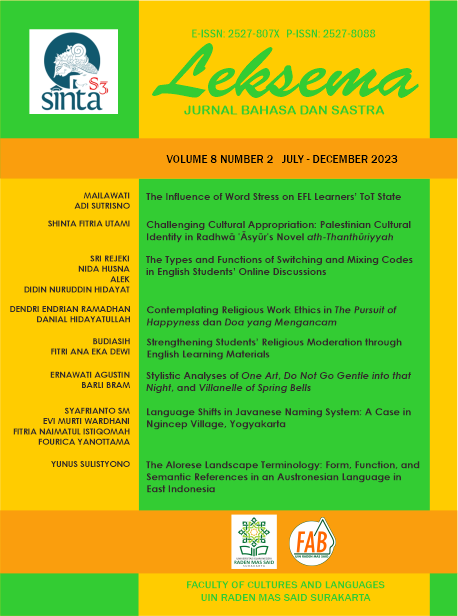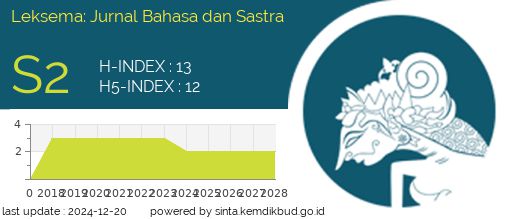THE INFLUENCE OF WORD STRESS ON EFL LEARNERS' TOT STATE
DOI:
https://doi.org/10.22515/ljbs.v8i2.6406Keywords:
EFL speakers, Tip of the Tongue, word stressAbstract
Tip of the Tongue (ToT) is a condition that hinders the production of fluency in speech. This study aims to identify stress patterns and factors that influence the emergence of ToT states. This research used a quantitative approach with the basis of ToT analysis theory from Brown and McNeill. For collecting data, it used an experimental design with EFL students in Kampung Inggris Pare as the objects by involving total 15 participants aged from 18th to 21st years old or late teens. The results show that the language features appearing from the experiment including words (65%), first syllables (24%), last syllables (3%), and letters (6%). The first syllable shows 21% occurrences more than that of the last syllable. There is no identification of stress in the completion of ToT in terms of the appearance of the dominating first syllable. It means that stress does not affect the completion of the ToT, but the frequency of syllables. The other factors that affect ToT in EFL include the mental processes of EFL learners, the sound imitations towards direct communication, and the teacher's role in teaching pronunciation.
Downloads
References
Akbar, Muhammad Aqil Haibatul, Elly Malihah, and Rini Andari. 2023. “Analisis Peran Masyarakat dalam Menciptakan Excellent Hospitality di Kampung Inggris Pare”. Media Bina Ilmiah 17 (9): 2183–90.
Athanasopoulou, Angeliki, Irene Vogel, and Nadya Pincus. 2021. “Prosodic Prominence in a Stressless Language: An Acoustic Investigation of Indonesian”. Journal of Linguistics, 1–14. doi:10.1017/S0022226721000141.
Brown, Roger and David McNeill. 1966. “The ‘Tip of The Tongue’ Phenomenon”. Journal of Verbal Learning and Verbal Behavior 5 (4): 325–37.
Cahyaningrum, Dewi. 2017. “Pembelajaran Bahasa Inggris pada Konteks EFL: Pemanfaatan Reciprocal Peer-teaching untuk Pembelajaran Keterampilan Menyimak dan Penguasaan Softskills”. Lingua: Jurnal Bahasa, Sastra, dan Pengajarannya 8 (1): 13–24.
Chomsky, Noam. 2006. Language and Mind (Third Edition). New York: Cambridge University Press. DOI:10.4324/9780203459492-11.
Dewi, Ira Septira and Hairus Salikin. 2022. “The Effectiveness of Semantic Priming to Overcome The Tip of The Tongue Phenomenon”. Kajian Linguistik dan Sastra 7 (1): 92–107. DOI:10.23917/kls.v7i1.16887.
Farrell, Meagan T. and Lise Abrams. 2011. “Tip-of-the-Tongue States Reveal Age Differences in the Syllable Frequency Effect.” Journal of Experimental Psychology: Learning, Memory, and Cognition 37: 277–85. DOI:10.1037/a0021328.
Fossa, Pablo, Nicolás Gonzalez, Camila García-Huidobro, Matías Barros, and María-isabel Sanhueza. 2022. “‘I Know It, But… I Have the Word on the Tip of My Tongue!’: TOT as Phenomenon to Re-thinking Metacognition and Feeling-of-Knowing in Psychology”. Culture and Education 34 (2): 369–402. DOI:10.1080/11356405.2022.2032985.
Grimmer, Hilary, Ruben Laukkonen, Jason Tangen, and William von Hippel. 2022. “Eliciting False Insights with Semantic Priming”. Psychonomic Bulletin & Review 29: 954–70. DOI:10.3758/s13423-021-02049-x.
Headen, Bianca A, Jenna M. Venuto, and Lori E. James. 2022. “High-Frequency First Syllables Facilitate Name–Face Association Learning”. Quarterly Journal of Experimental Psychology 0 (0): 1–8. DOI:10.1177/17470218221078851.
Hofferberth-Sauer, Nina Jeanette, and Lise Abrams. 2014. “Resolving Tip-of-the-Tongue States with Syllable Cues”. The Processing of Lexicon and Morphosyntax. October: 43–68.
Hulst, Harry van der, Rob Goedemans, and Ellen van Zanten. 2010. A Survey of Word Accentual Patterns in the Languages of the World. New York: De Gruyter Mouton.
Jebouri, Riyadh Sarhan Al. 2021. “A Study of Speech Error Phenomena T.O.T Experienced by Advanced EFL Speakers”. Psychology and Education Journal 58 (2): 831–40. DOI:10.17762/pae.v58i2.1957.
Kendra, Cherry. 2021. “Priming and the Psychology of Memory”. Verywell Mind. https://www.verywellmind.com/priming-and-the-psychology-of-memory-4173092.
Lee, Yeondong and Soyoung Choi. 2016. “Differences in Tip-of-the-Tongue Phenomenon and Resolving Patterns According to Vocabulary Characteristics between Young and Elderly Adults”. Communication Sciences and Disorders 21 (1). DOI: 10.12963/csd.16294.
Lin, Hsin- Pei, Anna K. Kuhlen, Alissa Melinger, Sabrina Aristei, and Rasha Abdel Rahman. 2022. “Concurrent Semantic Priming and Lexical Interference for Close Semantic Relations in Blocked-Cyclic Picture Naming: Electrophysiological Signatures”. Psychophysiology. October 2021: 1–27. DOI:10.1111/psyp.13990.
Nurfitriani, Sarra, Syamsi Setiadi, and Siti Ansoriah. 2023. “Interferensi Sintaksis Bahasa Indonesia terhadap Bahasa Inggris pada mahasiswa di Foreign Language Association”. Pentas: Pendidikan Bahasa dan Sastra Indonesia 9 (1): 43–50.
Pangesti, Fida and Arti Prihatini. 2020. “Tip of the Tongue dalam Ujaran Penutur Asing Bahasa Indonesia: Studi Kasus Mahasiswa Bipa”. Leksema: Jurnal Bahasa dan Sastra 5 (2): 201–11. DOI:10.22515/ljbs.v5i2.2200.
Rahman, Azkia Rostiani, Kushartanti, and Harwinta Juhria Anjarningsih. 2017. “Tip-of-the-Tongue Analysis in Indonesian Language Speaker: a Case Study”. People: International Journal of Social Sciences 3 (3): 292–300. doi:10.20319/pijss.2017.33.292300.
Rousseau, Luc and Nathalie Kashur. 2021. “Socially Shared Feelings of Imminent Recall : More Tip-of-the-Tongue States Are Experienced in Small Groups”. Frontiers in Psychology 12: 1–15. DOI:10.3389/fpsyg.2021.704433.
Saifullah, Aceng Ruhendi. 2018. Semantik dan Dinamika Pergulatan Makna. Jakarta: Bumi Aksara.
Schacter, Daniel L. 1999. “The Seven Sins of Memory”. American Psychologist 54 (3): 182–203.
Schwartz, Bennett L. 2002. Tip of the Tongue States: Phenomenology, Mechanism, and Lexical Retrieval. London: Lawrence Erlbaum Associates, Inc.
Shobikah, Nanik. 2017. “The Importance of English Language in Facing Asean Economic Community (AEC)”. At-Turats 11 (1). DOI:10.24260/at-turats.v11i1.873.
White, Katherine K. and Lise Abrams. 2002. “Does Priming Specific Syllables during Tip-of-the-Tongue States Facilitate Word Retrieval in Older Adults?” Psychology and Aging 17: 226–235. DOI:10.1037/0882-7974.17.2.226.
Widagsa, Rudha, Sri Wiyanah and Primasari Wahyuni. 2019. “The Influence of Indonesian Prosodic Features on English Word Stress Production”. English Review: Journal of English Education 7 (2): 77–84. DOI:10.25134/erjee.v7i2.1647.
Zock, Michael and Chris Biemann. 2020. “Comparison of Different Lexical Resources with Respect to the Tip-of-the-Tongue Problem”. Journal of Cognitive Science 21 (2): 193–252.
Downloads
Published
Issue
Section
License
Copyright (c) 2023 Leksema: Jurnal Bahasa dan Sastra

This work is licensed under a Creative Commons Attribution-NonCommercial-ShareAlike 4.0 International License.
The copyright of the received article shall be assigned to the publisher of the journal. The intended copyright includes the right to publish the article in various forms (including reprints). The journal maintains the publishing rights to published articles.
In line with the license, the authors and users (readers or other researchers) are allowed to share and adapt the material only for non-commercial purposes. In addition, the material must be given appropriate credit, provided with a link to the license, and indicated if changes were made. If authors remix, transform or build upon the material, authors must distribute their contributions under the same license as the original.







